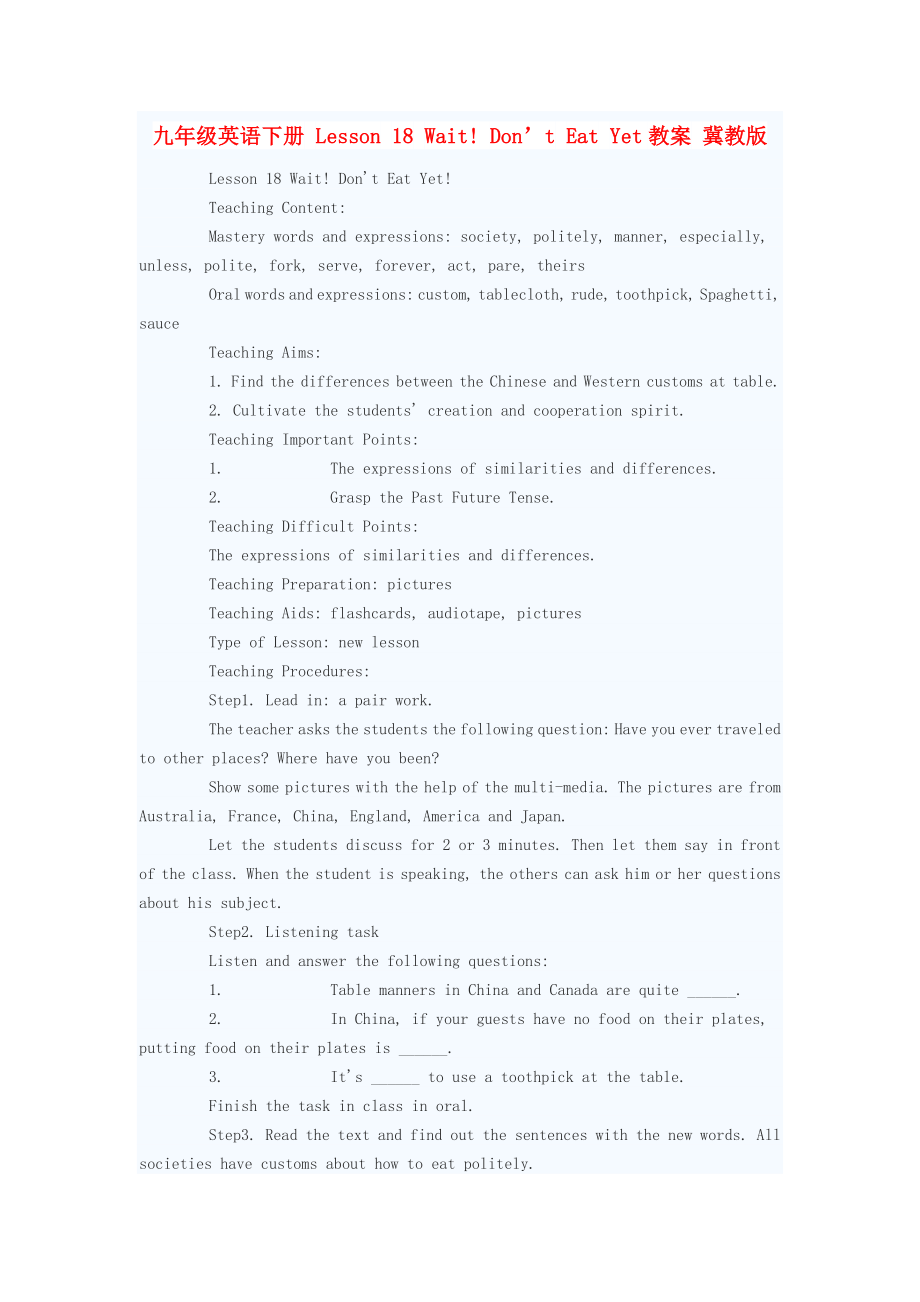《九年級(jí)英語下冊(cè) Lesson 18 Wait! Don’t Eat Yet教案 冀教版》由會(huì)員分享,可在線閱讀�,更多相關(guān)《九年級(jí)英語下冊(cè) Lesson 18 Wait! Don’t Eat Yet教案 冀教版(2頁珍藏版)》請(qǐng)?jiān)谘b配圖網(wǎng)上搜索�����。
1、九年級(jí)英語下冊(cè) Lesson 18 Wait! Don’t Eat Yet教案 冀教版
Lesson 18 Wait! Don't Eat Yet!
Teaching Content:
Mastery words and expressions: society, politely, manner, especially, unless, polite, fork, serve, forever, act, pare, theirs
Oral words and expressions: custom, tablecloth, rude, toothpick, Spag
2����、hetti, sauce
Teaching Aims:
1. Find the differences between the Chinese and Western customs at table.
2. Cultivate the students' creation and cooperation spirit.
Teaching Important Points:
1.?????? The expressions of similarities and differences.
2.?????? Grasp the Past Future Tens
3��、e.
Teaching Difficult Points:
The expressions of similarities and differences.
Teaching Preparation: pictures
Teaching Aids: flashcards, audiotape, pictures
Type of Lesson: new lesson
Teaching Procedures:
Step1. Lead in: a pair work.
The teacher asks the students the followin
4、g question: Have you ever traveled to other places? Where have you been?
Show some pictures with the help of the multi-media. The pictures are from Australia, France, China, England, America and Japan.
Let the students discuss for 2 or 3 minutes. Then let them say in front of the class. When t
5�、he student is speaking, the others can ask him or her questions about his subject.
Step2. Listening task
Listen and answer the following questions:
1.?????? Table manners in China and Canada are quite ______.
2.?????? In China, if your guests have no food on their plates, putting food on
6、 their plates is ______.
3.?????? It's ______ to use a toothpick at the table.
Finish the task in class in oral.
Step3. Read the text and find out the sentences with the new words. All societies have customs about how to eat politely.
We call these customs “table manners”.
It's okay t
7、o eat it, especially if it's something dry, like a piece of bread.
In Canada, if you drop something on the tablecloth, you pick it up and put it on your plate.
Parents are forever telling their children: “Don't talk with your moth full!”
Step4. Reading task:
Read the text and decide the
8、statements are true or false.
1.?????? In China, if you drop something on the tablecloth, you usually pick it up and eat it.
2.?????? In Canada, to finish the food in front of the class in rude.
In China, everybody has a knife at the table. Exercises: Fill in the blanks with the right forms
9、 of the words given.
1.?????? I think______(sing) loudly at table is not polite.
2.?????? It's rude ______ (point) to the others when you eat at table.
3.?????? His mother said he ______ (return) the fork to the restaurant tomorrow.
4.?????? Nobody ______(know) the secret except me.
S
10、tep6.Activity:
Project: What's the story?
1. Find pictures in magazines.
2. Make up a quick story about your picture.
3. Trade your picture with the students from another group. Practice:
Show some pictures to the students. Let the students picture them. Show some different pictures i
11、n different situations. Let them give vivid description. When they finish one picture, try to show them the whole story. If we don't have enough time, show them the main idea.
Step8.Consolidation
Suppose you have a foreign friend. He will e to China. Make a chart. Write down his/her name, his nationality, his language and his aims. Show it to your partner, then finish it in class.
 九年級(jí)英語下冊(cè) Lesson 18 Wait! Don’t Eat Yet教案 冀教版
九年級(jí)英語下冊(cè) Lesson 18 Wait! Don’t Eat Yet教案 冀教版

